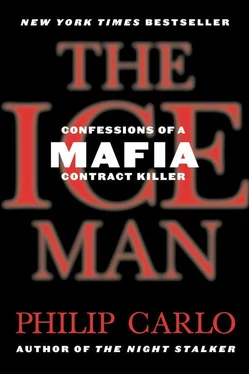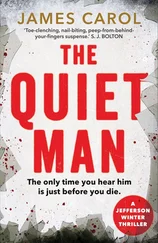Richard and Barbara’s mother didn’t get along. She didn’t like how he treated Barbara. Richard did, however, like Carmella—it was hard not to; she was gracious and kind and exceedingly giving.
Time seemed to fly by. Soon the holidays were upon them, and Richard very much enjoyed being at the joyously decorated Christmas dinner table with Barbara’s family, now as Barbara’s husband. Proud and content, he ate and drank and laughed and even sang along with the family. He was one of them.
Romantically, Richard couldn’t get enough of Barbara. The couple did not subscribe to any kind of birth control, and it didn’t take long for Barbara to become pregnant again. But she lost this child too, a miscarriage through natural causes. Doctors told her she had weak muscles along the vaginal canal and her muscles weren’t giving the proper support to the fetus, a condition none of the other females in her family had. But both Barbara and Richard wanted children, a family of their own, and quickly set out to make that happen.
Richard had no reservations about hitting Barbara in front of Nana or Genevieve. He viewed a man striking his wife, physically dominating her at will, as the normal order of things. That’s all he’d ever known growing up; and he slapped and pushed Barbara right in front of her mother.
“Richard, don’t do that!” Genevieve would admonish him, but he couldn’t care less. He once even threw a pillow at Genevieve and told her to mind her own business.
The couple finally rented a small apartment in West New York. What little money the couple had saved up was quickly exhausted. Richard hated being broke, wanting for things—furniture, clothes, a new car, a larger TV, a stereo player. It reminded him of the suffocating poverty and sacrifice of his youth. He became depressed, mean, short-tempered, and vented on Barbara, who had grown to view his abuse as a twisted though intrinsic part of her marriage, and she stoically learned to accept it. But Barbara grew further and further away from Richard. At times she felt she was a prisoner, not his wife, and surprisingly she often stood up to him, answered him back, disagreed with him, lashed him with her sharp, acerbic wit, which only fueled his anger. Barbara had always been an outspoken, independent person with an edge to her personality, and her overgrown husband wasn’t about to take that away from her. He broke her nose for smoking; he fractured ribs when she didn’t spread peanut butter on his sandwich the way he liked; he gave her black eyes; yet, she stood up to him, had shocking courage given Richard’s size and near-superhuman strength. Barbara was constantly amazed by his strength, how he could carry a refrigerator, a stove, a porcelain sink up to the second landing of their apartment all by himself, easily.
Barbara’s third pregnancy occurred, and under doctor’s orders, she took it easy, did exercises to strengthen her weak muscles. Richard was attentive, would not let her carry anything heavy. But he still struck her, abused her, if she angered him or gave him lip.
“Big man, tough guy, you’re nothing but a bully,” she’d say.
Often when Richard came home from work he talked about the film lab and his gay colleague Tommy Thomas. Though Barbara had never met him, she knew what he looked like because Richard had described him; he had a freckled hatchet face and carrot red hair.
One evening, when the couple was in bed watching The Milton Berle Show on TV, a funny-looking man with bright red hair appeared. Barbara offhandedly commented how odd he looked, that she imagined that’s how Tommy looked. Without warning Richard threw Barbara a beating, broke her nose, beat her so violently that she began bleeding from her vagina. He called her mother. Genevieve hurried over, took one look at her daughter, and called an ambulance. Barbara was now five months pregnant. The baby was coming out prematurely; its leg was actually sticking out of Barbara when the emergency doctors examined her. They helped the baby out; it was a boy. It was dead.
Barbara was distraught. She hated Richard. She so wanted to have a child, a boy; she was inconsolable. She thought about telling the authorities what had happened, but was deathly afraid of what Richard would do to her family, to her mother, to her cousin Carl, whom Barbara was very fond of, Richard knew; so she kept her mouth shut about the beating and how she had really lost the child.
In the afternoon, Richard showed up at the hospital as if nothing had happened, carrying beautiful fresh red roses and a big box of expensive chocolates. He didn’t say anything about what had occurred other than that it was Barbara’s fault, to which she said, “Yeah, sure, I beat myself up, I’m responsible for losing the child. Bullshit!” He ignored her. She came home two days later. She was quiet and sullen and wondered about her life with Richard, how she could deal with this violent madman she had married. The thought of suicide played in her head. She wondered if he’d physically abuse children they might have.
When Richard wanted to have sex with Barbara, she flat-out refused for the longest time, but he was not about to take no for an answer, and Barbara became pregnant still again, the fourth time. Richard promised he wouldn’t hit her, but if he came home in a bad mood, and something she did didn’t please him, he’d slap her. As Barbara’s stomach began to grow again, she summoned up the courage to tell him, “Richard, listen to me carefully… real carefully—if God blesses us with a child, and you hurt that child, hit that child, I swear I’ll kill you. I’ll cut your throat while you’re sleeping. I’ll poison your food…. I’ll kill you. Hitting me, abusing me, is one thing. You ever so much as lift a finger to my child, you’re dead.”
Strangely enough, Richard readily accepted this; he didn’t even answer her.
Barbara and Richard moved again, to a cute little garden apartment in Cliffside Park. The fourth pregnancy was very difficult for Barbara. For the last several months she was bedridden. She saw a pediatrician every week. Between doctor visits and everything else, money was short. To help make ends meet and have a little nest egg for the baby’s arrival, Richard took a second job driving a delivery truck. He worked all day at the lab, took the bus home, had a quick dinner, went and drove the delivery truck most of the night; then he would sleep a few hours before he had to go back to the lab. He was always tired, in a bad mood, his body aching, and still he was coming up short. Having a child was an expensive proposition. The harder I worked, it seemed, the less we had. I felt like I was… I was drowning, and no matter how hard I tried, I couldn’t stay afloat, Richard explained.
Against his better judgment and the solemn promise he’d made to himself, Richard decided to become a player again; now, however, he would be much more careful and judicious, not take any undue chances, he vowed.
And he soon turned to his old friend—crime.
Richard contacted a couple of fellows he knew back in Jersey City, two hard-boiled Irishmen who were quiet and stand-up, discreet and tough, professional hijack artists. One was John Hamil, the other Sean O’Keefe. They had contacts with guys who worked in different trucking companies and sometimes got tips about good loads. They knew that Richard was reliable and tough, that he kept his mouth shut—and that he was deadly. The three of them, tipped off by a loader, staked out a trucking company in Union.
They saw how truckers just pulled into the yard, hooked up to a rig, and drove away, waving to the security guard as they went. This, they decided, would be an easy way to get their hands on valuable loads without so much as a how-do-you-do. Richard even went to a truck-driving school to learn the intricacies of handling an eighteen-wheeler. He was the only one who had the balls to just drive onto the lot and hook up to a rig as if he had every right, so outright bold no one even thought of questioning him.
Читать дальше












